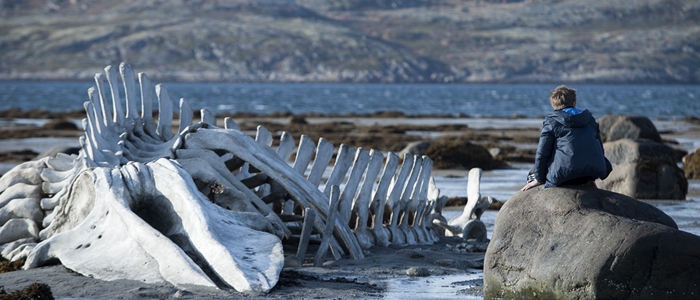Film Review: 'Leviathan'
05/22/2014
At age 50, Russian master Andrey Zvyagintsev delivers a stunning, surprisingly funny satire that dares to question whether his homeland is servings its citizens' best interests.
In "Leviathan," which director Andrey Zvyagintsev has described as a loose retelling of the Book of Job, an ordinary man must wrestle with his faith not in God but in the Russian state — an epic struggle against a monster with many faces possessed of the capacity to bend the law to suit its own appetites. Resistance is futile, as they say, and yet this stunning satire's embattled patriarch valiantly perseveres for the sake of his family, even as it crumbles around him. Debuting in competition at Cannes, this engrossing, arthouse-bound opus spans a meaty 142 minutes and unfolds with the heft of a 1,000-page novel.
Lest you think Zvyagintsev's latest a work of science fiction, the leviathan in question is strictly metaphorical — a concept borrowed from Thomas Hobbes' 1651 treatise of the same name. That may come as a disappointment to those who've likened the 50-year-old slow-cinema auteur to a latter-day Andrei Tarkovsky, hoping this might be the abstract metaphysical feature they'd been waiting for. And yet, there's ample cause for celebration: This is the director's most accessible and naturalistic film, using everyday characters to test how well modern-day Russia is maintaining the social contract with its citizens.
The setting is a small town on the Kola Peninsula in northwest Russia, a has-been fishing community littered with the carcasses of ships and whales alike, far from Moscow and yet close enough to "civilization" that the locals can practically see Finland from their backyards. Come for the scenery, stay for all that's rotten beneath the surface in what amounts to an expose touching on the many challenges that face the country today: religion, politics, guns and alcohol.
No doubt, when his ancestors settled the riverside homestead on which Kolya (Alexey Serebryakov) and his family — son Roma (Sergey Pokhodaev) and sexy second wife Lilya (Elena Lyadova) — still live, they never imagined a crooked mayor (Roman Madyanov) would one day seize the land to do with as he pleased. But Kolya is no pushover, enlisting his longtime lawyer friend Dmitri (Vladimir Vdovitchenkov) all the way from Moscow to contest the mayor's claim of eminent domain.
First stop is court, where a clerk speed-reads a laundry list of bad news. In Zvyagintsev's past films, from 2003 Venice Film Festival winner "The Return" to 2011's Un Certain Regard-selected "Elena," the helmer meditatively held certain shots to the brink of patience. With the exception of this drawn-out courtroom scene, which he plays for absurdist comedy (a la Romanian satire "Police, Adjective"), and a few extended driving sequences (echoes of Turkish procedural "Once Upon a Time in Anatolia"), "Leviathan" typically moves much faster, covering far more ground over the course of its densely packed narrative.
Having been denied their appeal, Kolya and Dmitri go up the bureaucratic chain, only to be ignored by both the prosecutor's office and the judge, who clearly do the mayor's bidding. The same goes for the city's corrupt police force and perhaps even the resident Orthodox Christian clergy. But Dmitri has an ace: When official channels fail, he schedules a meeting with the mayor and blackmails him with a binder loaded with evidence that amounts to "a horror movie with you in the lead."
Another movie might end here, but "Leviathan" is just getting started, and though we don't always know what we're looking at or why, the film offers a banquet of surprises, right down to the shocker lurking in the pic's final minutes. The experience feels akin to that of binge-watching a season of a juicy HBO series as our attention shifts among the various players in this relatively expansive, well-rounded ensemble. Though Kolya has been present from the moment Philip Glass' agitated overture subsides, it takes nearly two hours for this emotionally, spiritually and financially depleted character to fully reveal himself as the film's vodka-fueled protagonist.
In the end, nothing will surprise Zvyagintsev fans more than discovering how funny the film is, as the helmer and co-writer Oleg Negin (a collaborator on "The Banishment," the family tragedy this most resembles) extend the darkly satirical streak they began with "Elena." Whereas that film was criticized by some as judging the lower classes too harshly, this one is unequivocally empathetic toward its working-class characters, who suffer daily at the hands of corrupt politicians. Imagine an American movie in which off-duty cops use portraits of past presidents for target practice, or a scene in which an openly sinful, absolution-buying mayor cautions his son, "God sees everything."
But does He? Even Zvyagintsev (god of his own realm) seems to miss critical moments: A key altercation and a possible murder both occur offscreen, leaving mysteries for the audience to put together. Meticulously composing images in steel blues and icy grays, his directorial style is so distant — the characters all but swallowed by d.p. Mikhail Krichman's overwhelming anamorphic widescreen vistas — that it leaves a great deal open to personal interpretation.
At precisely the moment when nothing seems certain, a local religious leader preaches, "Freedom is knowing God's truth," to which Hobbes himself might respond, "Hell is truth seen too late." As some will surely recall, "Leviathan" was the book in which the English philosopher famously suggested that an ideal government protects citizens from lives that are "solitary, poor, nasty, brutish and short." Without calling for outright reform, Zvyagintsev's version questions how long a man can go on believing in a system that offers no better.
Peter Debruge
"Variety"
